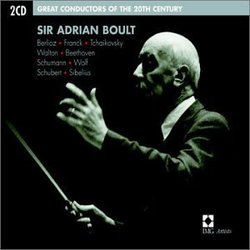| All Artists: Hector Berlioz, Cesar Franck, Pyotr Il'yich Tchaikovsky, William [composer] Walton, Ludwig van Beethoven, Robert Schumann, Hugo [Composer] Wolf, Franz [Vienna] Schubert, Jean Sibelius, Adrian Boult, London Philharmonic Orchestra, London Orchestra Society, New Philharmonia Orchestra, Philharmonia Orchestra of London Title: Sir Adrian Boult Members Wishing: 0 Total Copies: 0 Label: EMI Classics Release Date: 2/11/2003 Album Type: Original recording remastered Genre: Classical Styles: Forms & Genres, Theatrical, Incidental & Program Music, Historical Periods, Classical (c.1770-1830), Symphonies Number of Discs: 2 SwapaCD Credits: 2 UPC: 724357545921 |
Search - Hector Berlioz, Cesar Franck, Pyotr Il'yich Tchaikovsky :: Sir Adrian Boult
 | Hector Berlioz, Cesar Franck, Pyotr Il'yich Tchaikovsky Sir Adrian Boult Genre: Classical
|
Larger Image |
CD Details |
CD ReviewsEclectic boult Mr. Ian A. Macfarlane | Fife, Scotland | 02/11/2003 (5 out of 5 stars) "This 2-CD set represents Boult with material which has mostly long been deleted, but all of it is good and some exceptional. They've gone for atypical composers - though Boult conducted almost everyone you can think of in his long career. Only one English work is there - 'Portsmouth Point' - in a performance which knocks the socks off anything else I've heard. Absolutely magical are Wolf's'Italian Serenade' with the Philharmonia, which appeared briefly on a 7-inch disc long ago, 'Coriolan', which is just SO right and some Berlioz (with minor tuning problems at the outset but a very sure grasp of how this composer really 'works'. There's a Schumann 4 (weighty and authentic), Schubert 4 (too big a band but full of life), and the fine perfromance of Franck's Symphony that he made for RCA/Reader's Digest. There's more (Sibelius, Tchaikovsky), and all good. It's a pity Boult wasn't able to record more non-English repertoire towards the end of his life, but these performances help to make up for that. No need to hesitate ; it's good stuff." Boult's little-known skill outside British music Santa Fe Listener | Santa Fe, NM USA | 11/06/2005 (4 out of 5 stars) "Making a case for Adrian Boult as a great conductor isn't easy outside the special province of English composers like Vaughan Williams and Elgar. So it was brave of the compilers here to eliminate all things British except for Walton's short Portsmouth Point Over. Yet this piece undercuts their purpose since it is the most exciting and personal performance on either of the two CDs (it's only equalled by the Prelude to Sibelius's The Tempest that ends the second disc).
What we learn from a solid Franck D minor symphony and the Schubert Fourth Symphony is that Boult had a very agrreable musical personality, vigorous in temperament, not terribly exacting as to orchestral technique. Both performances are direct and enthusiastic, and the Franck benefits from almost no rubato--it avoids all the pitfalls of Franck's slithery chromatic style. I wouldn't say that Boult ranks with Barbirolli and Beecham in his generation; one doesn't feel that he is inspired, but he is much more than just a spirited stick-waver like Malcolm Sargent. He doesn't dig deep into the Coriolan Over., but his spirited, proficient reading is stirring. The Berlioz Rob Roy Over. is in dull mono sound from 1956, as is the Schumann Fourth recorded at the same time, but both are steady, agreeable readings that exude a sense of cheerfulness which is pretty much present everywhere. All in all, I was happy to hear Boult outside his British fiefdom and would judge this one of the better installments of the Great Condcutors series." |

 Track Listings (18) - Disc #1
Track Listings (18) - Disc #1